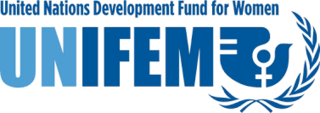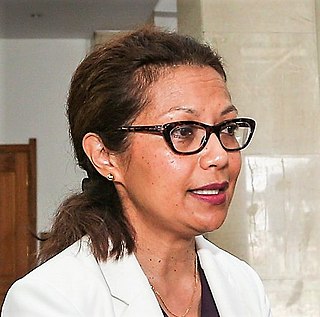Related Research Articles
Gender equality, also known as sexual equality or equality of the sexes, is the state of equal ease of access to resources and opportunities regardless of gender, including economic participation and decision-making; and the state of valuing different behaviors, aspirations and needs equally, regardless of gender.

The United Nations Development Fund for Women was established in December 1976 originally as the Voluntary Fund for the United Nations Decade for Women in the International Women's Year. Its first director was Margaret C. Snyder. UNIFEM provided financial and technical assistance to innovative programmes and strategies that promoted women's human rights, political participation and economic security. Since 1976 it supported women's empowerment and gender equality through its programme offices and links with women's organizations in the major regions of the world. Its work on gender responsive budgets began in 1996 in Southern Africa and expanded to include East Africa, Southeast Asia, South Asia, Central America and the Andean region. It worked to increase awareness throughout the UN system of gender responsive budgets as a tool to strengthen economic governance in all countries. In 2011, UNIFEM merged with some other smaller entities to become UN Women.

Charlotte Anne Bunch is an American feminist author and organizer in women's rights and human rights movements. Bunch is currently the founding director and senior scholar at the Center for Women's Global Leadership at Rutgers University in New Brunswick, New Jersey. She is also a distinguished professor in the Department of Women's and Gender Studies at Rutgers.

Violence against women (VAW), also known as gender-based violence and sexual and gender-based violence (SGBV), are violent acts primarily or exclusively committed by men or boys against women or girls. Such violence is often considered a form of hate crime, committed against women or girls specifically because they are female, and can take many forms.
Gender mainstreaming is the public policy concept of assessing the implications for people of different genders of a planned policy action, including legislation and programmes. Mainstreaming offers a pluralistic approach that values the diversity among people of different genders.

International Women's Year (IWY) was the name given to 1975 by the United Nations. Since that year March 8 has been celebrated as International Women's Day, and the United Nations Decade for Women, from 1976 to 1985, was also established.

The Center for Women's Global Leadership, based at Rutgers University, was founded in 1989 by Charlotte Bunch, the former executive director and an internationally renowned activist for women's human rights. Executive Director Krishanti Dharmaraj is also the founder of the Dignity Index and co-founder of WILD for Human Rights and the Sri Lanka Children's Fund. The former executive director, Radhika Balakrishnan, is now the faculty director, and a professor in the Department of Women's and Gender Studies at Rutgers, chair of the Board of the US Human Rights Network, and a board member of the Center for Constitutional Rights. Located on Douglass Residential College at Rutgers University, CWGL is a unit of International Programs within the School of Arts and Sciences and is a member of the Institute for Women's Leadership, a consortium of women's programs at Rutgers.
The Declaration on the Elimination of Violence Against Women was adopted without a vote by the United Nations General Assembly in the 48/104 resolution of 20 December 1993. Contained within it is the recognition of "the urgent need for the universal application to women of the rights and principles with regard to equality, security, liberty, integrity and dignity of all human beings". It recalls and embodies the same rights and principles as those enshrined in such instruments as the Universal Declaration of Human Rights, and Articles 1 and 2 provide the most widely used definition of violence against women.

Diane Rosemary Elson is a British economist, sociologist and gender and development social scientist. She is Professor Emerita of sociology at the University of Essex and a former professor of development studies at the University of Manchester.
The feminist movement has effected change in Western society, including women's suffrage; greater access to education; more equitable pay with men; the right to initiate divorce proceedings; the right of women to make individual decisions regarding pregnancy ; and the right to own property.
The United Nations Entity for Gender Equality and the Empowerment of Women, also known as UN Women, is a United Nations entity working for gender equality and the empowerment of women. UN Women advocates for the rights of women and girls, and focuses on a wide array of issues, including violence against women and violence against LGBTIQ+ people.
Mary Shanthi Dairiam is a Malaysian human rights and women's rights advocate. She was the elected member from Malaysia to the Committee on the Elimination of All Forms of Discrimination against Women serving the Committee from 2005 - 2008.

Virginia "Gina" Vargas Valente is a Peruvian sociologist and a well-known figure in the women's movement in her country.

Milena Pires is an East Timorese politician and women's rights activist who served as director of the United Nations Development Fund for Women (UNIFEM) in East Timor. Since 2016, she has been the Permanent Representative of East Timor to the United Nations.

Lepa Mladjenovic is a feminist, lesbian, anti-war activist who is a pioneer of second-wave feminism in Serbia. She is a feminist counselor for women survivors of male violence or lesbophobia, a workshop facilitator, a writer and lecturer and a member of several international boards and networks which are concerned about lesbian rights and violence against women. Mladjenovic is considered a symbol of women's activism in the former Yugoslavia. Born in Belgrade, she spent her childhood summer holidays in Sarajevo and at the Adriatic Sea. As of 2017, Mladjenovic lives in Belgrade.
Mozn Hassan is an Egyptian women's rights campaigner. The founder of Nazra for Feminist Studies, she took part in the protests of the Egyptian revolution of 2011 and worked to help those who were sexually assaulted at the time. Since then she successfully campaigned for changes to be made to the Constitution of Egypt and sexual crime laws to safeguard women. Hassan was awarded the Global Fund for Women’s inaugural Charlotte Bunch Human Rights Award in 2013. She also received the Right Livelihood Awards, known as the "alternative Nobel Peace Prize", in 2016. She is currently subject to a travel ban and asset freeze by the Egyptian government for allegedly violating foreign funding laws.
Niamh Reilly is an Irish political scientist. She is Established Professor of Political Science and Sociology at the National University of Ireland, Galway. She has worked with the United Nations on women's rights issues and the Irish government's Standing Committee on Human Rights. In 2007 she joined the National University of Ireland, Galway, where she is Established Professor, the Irish equivalent of a distinguished professorship.

Ana María Falú is an Argentine architect and a social activist for human rights and for women's rights. She has been Regional Director of the United Nations Development Fund for Women for the Andean Region (2002–2004) and for Brazil and the Southern Cone Countries (2004–2009). She is a researcher and Professor at the National University of Córdoba (UNC), where she is the Director of the Housing and Habitat Research Institute (INVIHAB). In the field of feminist action, she promoted numerous institutional initiatives and contributed to the establishment of women's rights to the city, to housing, and to the habitat. She is co-founder of the Women and Habitat Network of Latin America, of the Centro de Intercambio y Servicios para el Cono Sur Argentina (CISCSA), of UNC's Interdisciplinary Program of Women's and Gender Studies (PIEMG), and of Articulación Feminista Marcosur, among other areas of action in favor of women's rights. In 2013 she won the Feminist Career Award together with other Argentine women.

Shahra Razavi is an Iranian-born academic and senior United Nations official specialising in gender and social development. A graduate of the London School of Economics and Oxford University, Razavi is currently Director of the Social Protection Department of the International Labour Organisation in Geneva, Switzerland.
Yakin Ertürk is a Turkish former United Nations special rapporteur on violence against women and board member of the United Nations Research Institute for Social Development (UNRISD), and was a professor of Sociology.
References
- 1 2 Chesler, Ellen; McGovern, Terry (2016). Women and Girls Rising: Progress and resistance around the world. New York: Routledge. ISBN 978-1-317-48265-9. Archived from the original on 27 September 2020. Retrieved 30 June 2020.
- 1 2 Stromquist, Nelly P. (1998). Women in the Third World: An Encyclopedia of Contemporary Issues. New York: Routledge. ISBN 978-1-135-49861-0. Archived from the original on 27 September 2020. Retrieved 30 June 2020.
- 1 2 Garrido, Anahi Russo (2015). "Interview with Charlotte Bunch: Human Rights and Gender Equality". In Brooks, Adrian (ed.). The Right Side of History: 100 Years of LGBTQI Activism. New York: Cleis Press. pp. 138, 142. ISBN 978-1-62778-123-7. Archived from the original on 27 September 2020. Retrieved 30 June 2020.
- 1 2 Coward, Ros (1 August 1997). "Sign of the Crimes Against Women". The Mail & Guardian. Archived from the original on 27 September 2020. Retrieved 26 June 2020.
- 1 2 3 Hudson, Natalie Florea (2010). Gender, Human Security and the United Nations: Security Language as a Political Framework for Women. London: Routledge. p. 99. ISBN 978-1-135-19693-6. Archived from the original on 27 September 2020. Retrieved 30 June 2020.